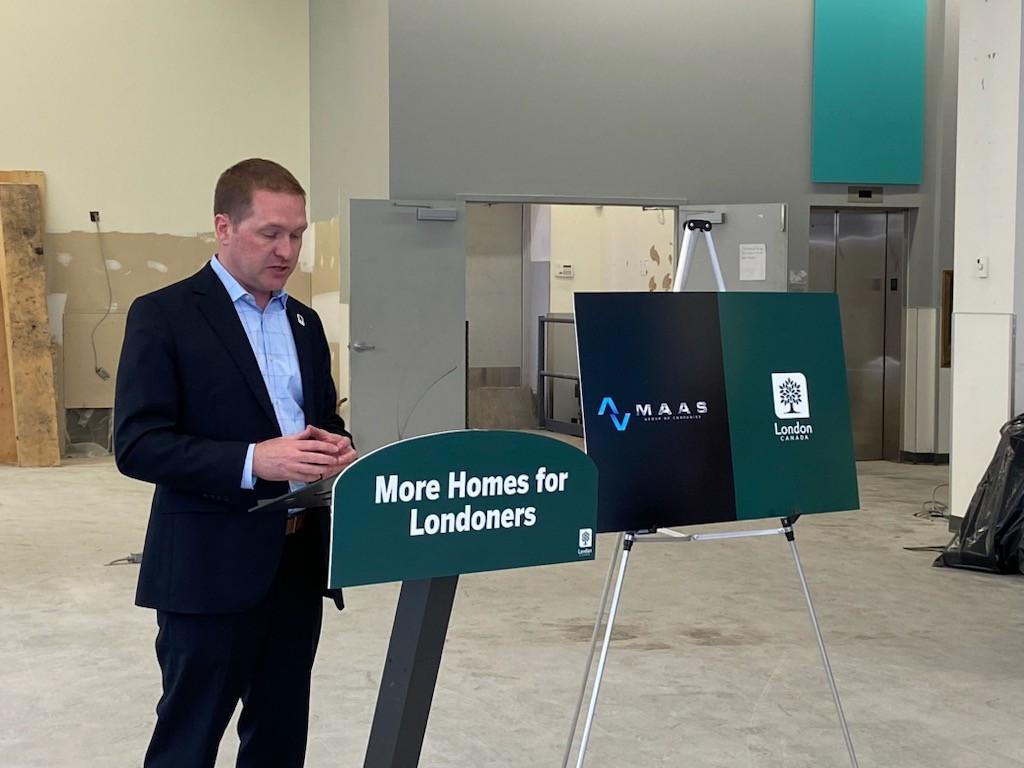The City of London has approved its first successful application to the new office-to-residential community improvement program (CIP).

The former Rexall building at 166 Dundas St., at the corner of Dundas and Richmond streets, is being transformed into 15 residential units. Floors three through five will be primarily two-bedroom residential units, with one of these units being a one-bedroom. On the first and second floors, there will still be commercial space. At this time, it is still undetermined what store, or stores, will occupy the lower levels.
“This project is significant because it sees the achievement of multiple strategic initiatives all rolled into one: the creation of new housing, the repurposing of vacant commercial space, and our walk towards the revitalization of downtown,” Ward 13 Coun. David Ferreira says. “It highlights what our city is doing in a time of crisis and need, and it shows what happens when we come together with ideas.”
The real estate development firm MAAS Group recently purchased the building from Farhi Holdings and promptly decided to convert the unused office spaces into residential units.

Get breaking National news
“Construction is underway now, and those units will be ready for occupancy by this fall,” Mayor Josh Morgan says.
- Canadians say Puerto Vallarta a ‘war zone’ amid escalating violence
- As Carney heads to India, Canada seeks to revoke citizenship of 2008 Mumbai attack ‘mastermind’
- Vancouver airport ties Nexus outage to U.S. partial government shutdown
- What’s a Canadian firm under defence industrial strategy? It’s complicated
The project for this building received $414,947 of the available $10 million in funding from the city, but there is flexibility in the event it requires more, or if there are funds remaining post-construction that can be allocated to another project.
“When we see people investing money in this core of the city at this iconic corner of our city, we know things are changing and on the move,” Morgan says. “Downtown is getting better and things are improving. It’s unquestionable that we are moving in the right direction. Now that doesn’t mean there’s not a ton of work left to do, but we are undeniably better than we were 12 to 18 months ago.”
The program provides a grant that functions as a forgivable loan, up to $2 million per property. Across the city, there are 7,100 high-density residential units under construction.
“We look forward to more successful applicants for this program,” Morgan says. “Our community is desperate for more housing of all types, and the speed at which this proposal is moving reflects that it’s admirable and appreciated.”
The office-to-residential CIP allows for timely conversion projects that will increase the supply of residential units downtown, while also tackling the housing crisis. Though 166 Dundas St. will list units at market value, some of the units within the project will be geared-to-income and affordable housing units.
“I know the future residents of this building will enjoy the benefits of being able to easily walk, bike and take transit – all those mobility options are available in the downtown core,” says Scott Mathers, deputy city manager for planning and economic development. “They’re going to be able to experience all the wonderful events of Dundas Place.”
Morgan initially announced the details of how the office-to-residential program conversion would look in the city, which was later approved by council in February. The federal government announced the housing accelerator fund in January, and London was the first city to receive funding under that program.
“This office residential conversion program is one of the many ways we’re trying to improve the amount of housing, improve the speed and efficiency of providing housing in London,” Mathers says. “We’ve got more applications, we really want to have a lot more of this housing being provided in the core of the city.”












Comments
Want to discuss? Please read our Commenting Policy first.